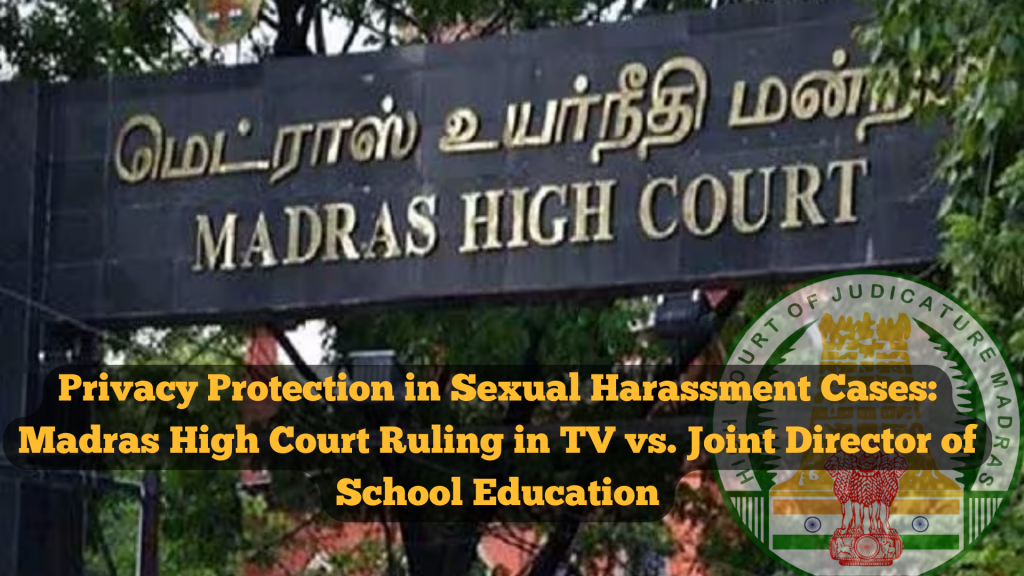
Privacy Protection In Sexual Harassment Cases: Madras High Court Ruling
Judgement Given On : 15/12/2021
In the case of TV vs. Joint Director of School Education, the Madras High Court, in its judgment delivered on December 15, 2021, rendered a significant decision emphasizing the paramount importance of safeguarding the privacy and security of complainants in sexual harassment cases. The Court held that authorities are not obliged to disclose specific information related to such complaints and proceedings to the alleged harasser if doing so would imperil the safety and privacy of the complainant.
Facts of the case:
The petitioner, a school headmaster, became the subject of a sexual harassment complaint filed by a teacher within the same educational institution. Subsequently, a duly constituted inquiry committee, herein referred to as the “Respondents,” conducted a comprehensive investigation into the allegations.
The petitioner sought access to the inquiry proceedings, a request that was denied. Following an unsuccessful appeal, the petitioner resorted to filing a writ petition in 2008.
The petitioner also raised concerns over the lack of response to his application filed under the Right to Information Act (“RTI Act”).
This matter prompted the petitioner to lodge a formal complaint before the Tamil Nadu Information Commission (“Commission”), which subsequently dismissed his complaint. Consequently, the petitioner initiated the instant writ petition.
Legal Submissions:
Counsel representing the petitioner asserted that the rejection of his RTI application, predicated on Section 8(1)(g) of the RTI Act, which deals with exemptions from disclosure of information that may endanger someone’s life and physical safety, was unwarranted. It was contended that the information sought by the petitioner was imperative for his defense.
Therefore, the rejection order handed down by the Commission was deemed legally flawed. The petitioner’s legal representatives referenced several judicial precedents, including Jogendrasinhji Vijaysinghji vs. State of Gujarat (2015) and The Nonsuch Tea Estates Ltd. vs. The State Chief Information Commissioner (2010), to underscore the rights of individuals seeking information and to critique the casual or improper dismissal of their applications.
Conversely, the Respondents submitted a counter affidavit. It was disclosed that a teacher had submitted a petition to the District Social Welfare Officer, outlining the sexual harassment experienced at the hands of the petitioner. The petitioner was revealed to have withheld monetary benefits from the teachers, causing them considerable mental distress.
Consequently, an inquiry committee was constituted, and teachers provided detailed accounts of their experiences. In response, authorities from the Education Department ordered that the school be placed under the supervision of the District Educational Officer to ensure direct payment to the teachers and staff.
The petitioner, aggrieved by this order, had filed a writ petition challenging it in 2008. The authorities subsequently furnished all relevant records to the Commission, which dismissed the petitioner’s appeal while citing Section 8(1)(g) of the RTI Act.
Court’s Legal Analysis:
The Court engaged in a meticulous analysis of the nature of the information sought by the petitioner. This information included particulars such as the number of teachers who had registered complaints with the District Educational Officer, copies of the complaints, and photographs of the teachers. The Court discerned that divulging such information would undoubtedly imperil the safety and physical well-being of the teachers involved. Therefore, the Court held that, for security reasons, personal information concerning sexual harassment complaints must be shielded from disclosure. The Court underscored that it has been a consistent judicial stance that the identities of complainants in such cases should remain confidential.
The Court additionally concluded that the judgments referenced by the petitioner were inapplicable to the present matter and did not support his claims. The dismissal of the petitioner’s RTI application would not deprive him of the ability to mount a defense against the allegations before the competent authority.
Final Legal Decision:
The Madras High Court, in its final legal determination, dismissed the writ petition. The Court emphasized that an application made under the RTI Act cannot be linked to disciplinary or other proceedings pending before various authorities governed by existing rules or enactments. In rendering this decision, the Court prioritized the protection of the privacy and security of complainants in sexual harassment cases over the alleged harasser’s right to access specific information.
